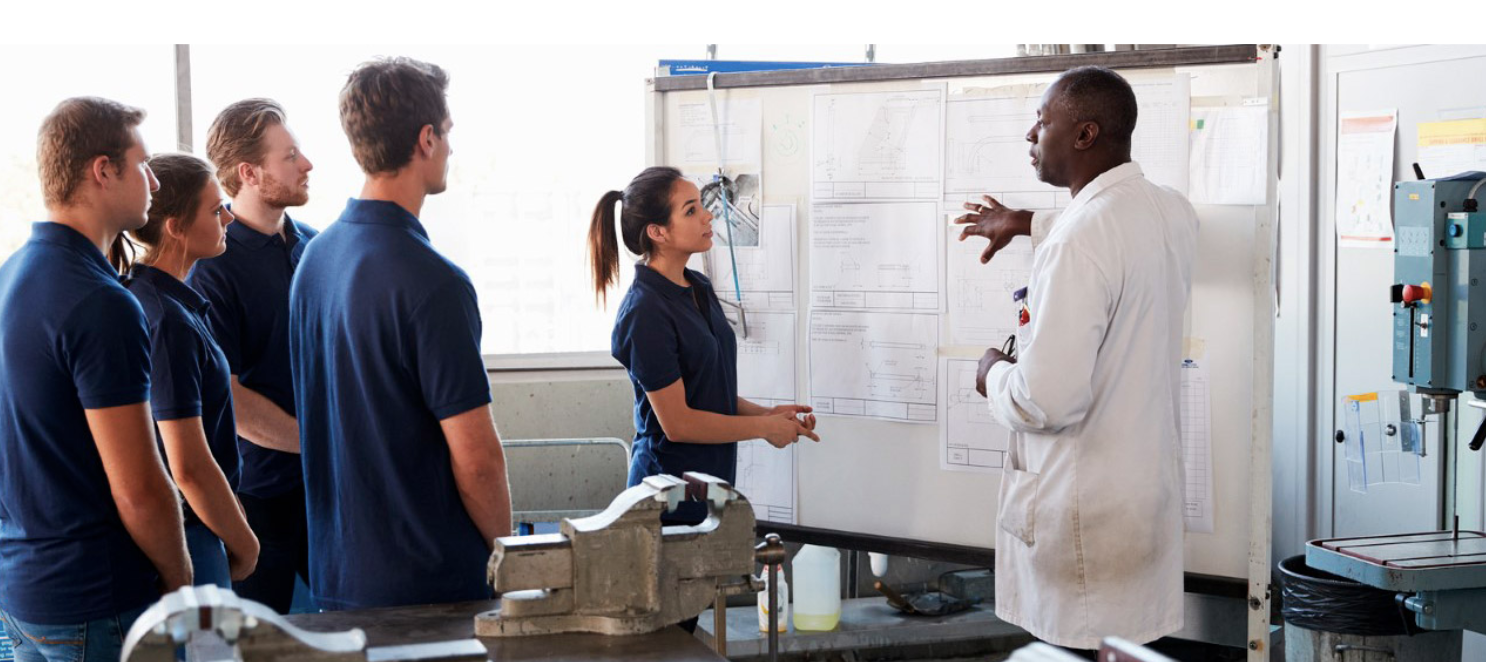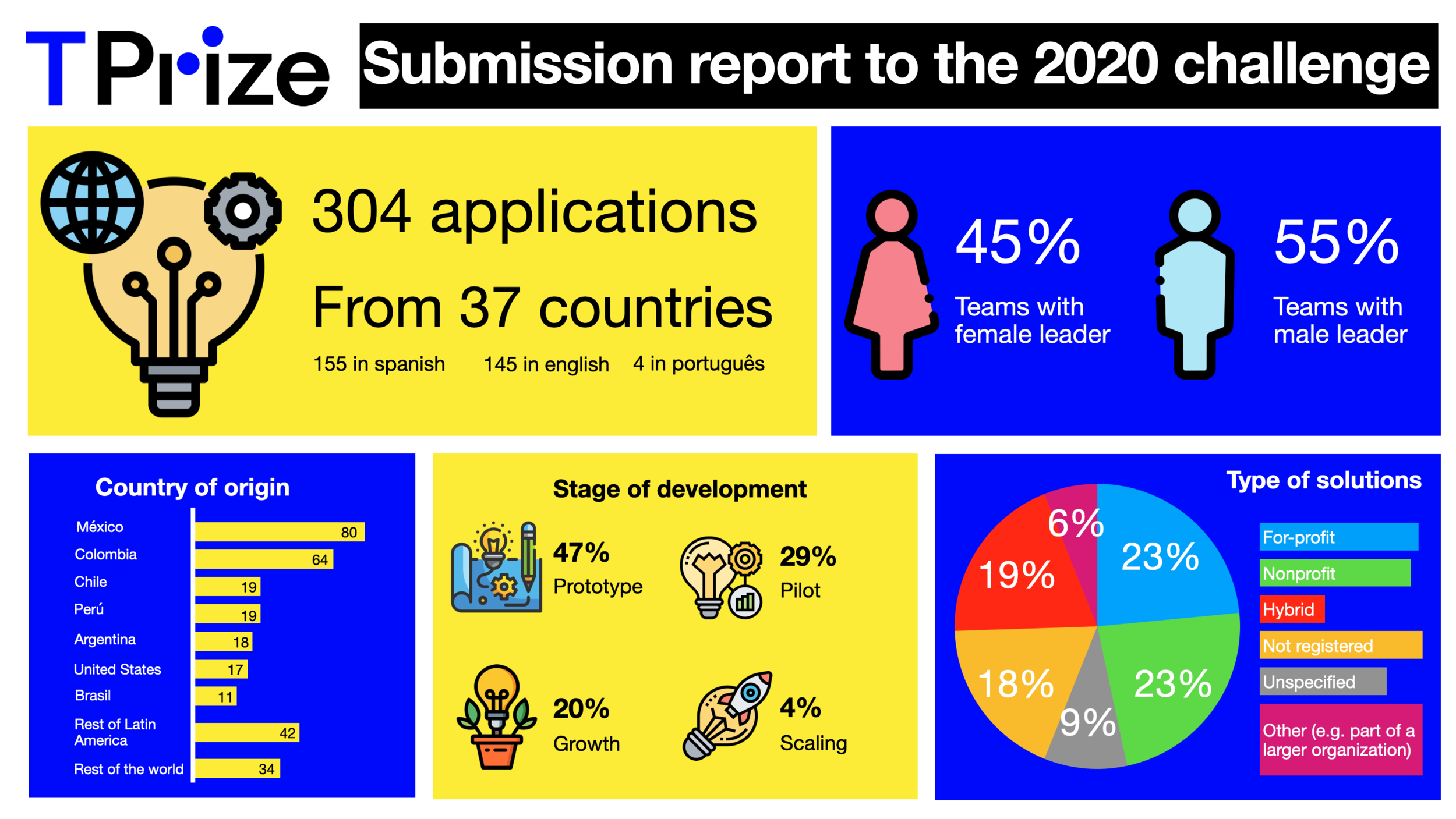The Tprize challenge featured more than 300 applications from 37 countries. Of the proposals received, 45% were from teams led by women.
On December 20, 2019, Tec de Monterrey and Universidad de Los Andes, with the support of MIT Solve, launched the TPrize 2020 Challenge. This award seeks to encourage entrepreneurs to generate solutions aimed at social and educational problems in Latin America and the Caribbean.
Through collective intelligence, the TPrize 2020 call invited potential entrepreneurs to come up with ideas on how to create projects with which disadvantaged communities design and participate in lifelong learning opportunities that help them build life models productive and prosperous in the XXI century. The TPrize 2020 challenge consisted of solving the following question:
How can disadvantaged communities design and participate in skills-based and lifelong learning opportunities to create productive and prosperous livelihoods in the 21st-century?
With this challenge, TPrize seeks to find and support technological solutions to close the skills gap for work and promote lifelong learning opportunities in the Latin American and Caribbean region. Five months after the call began, and after analyzing more than 300 applications from 37 countries, on May 26, the ten finalists of the TPrize 2020 challenge were announced.
The ten finalists of the TPrize 2020 Challenge
-
Ser Maestro | Jaime Montes García (Peru)
-
Ecolab 4.0 | Luis Cambar (Venezuela)
-
Forte | Nat Ware (Colombia)
-
MicroMentor | Loretta Taylor (USA / Mexico)
-
Lab4U | Komal Dadlani (Chile / Mexico)
-
Skilllab | Ulrich Scharf (Netherlands)
-
SolarSPELL | Laura Hosman, Martín Pérez and Stephanie Petersen (USA)
-
Agricultural Biotechnology Academy | Camila Martínez (Chile)
-
ConHector | Tatiana Rincón (Colombia)
-
Kit Kit School | Andrés Beltrán (Colombia)
Meet the finalist projects
Ser Maestro: a platform for rural teachers
In Peru, innovative rural teachers are not identified, accompanied, or valued for their remoteness and high cost. During the last years, many of them have generated successful projects, but their achievements were not recognized, and they were forgotten.
The “Ser Maestro” platform has constituted a network of innovators, training, and motivating many of them to become volunteer advisers to other rural teachers who are interested in innovating. The platform has created its own methodology called INNO, a tool for the design and management of projects in an easy way, with high impact.
The INNO methodology is based on two pillars, the design of learning projects based on the competency-based approach and the construction of knowledge following complex pedagogy. The method promotes gradualness, diversity, and equity, it is based on an algorithm that allows teachers to simply follow their process of designing, managing and evaluating their projects, it requires a high level of abstraction and understanding of the autonomous, creative and critical of the student, needs to include nature, community, and spirituality.
More information: https://sermaestro.org/
Ecolab 4.0
Ecolab was born as a scalable and replicable model to address four problems: student desertion, digital illiteracy, lack of quality in educational infrastructure, and reliable waste sanitation in vulnerable communities.
The team developed Eco3D, a low-cost augmented reality 3D printing system that works with soda bottles. With this system, young people can manufacture advanced educational tools at low cost from plastic waste, a classroom construction system made from a mix of PET cement. It includes a pedagogical model based on ludic projects. For the development of necessary competencies and skills in Industry 4.0, like 3D modeling, programming, mechatronics, robotics, video game design, paleo-biology with virtual reality, and augmented reality.
Thus, in 2018 the first Ecolaboratory was established that serves as a recreational education space and benefits more than 4000 young people. Ecolab can be implemented as a modular upgrade in schools in the Latin American region.
Forte: A Brand New Way to Finance Reskilling at No Cost
Forte is a new, better way to finance retraining. It’s a way to finance reskilling at no cost to individuals or governments. Forte utilizes a new financial approach we have invented, which is based on the fact that the cost of training is often far less than the increase in government income tax revenue caused that training.
In essence, Forte enables individuals to pay for their own training with their future personal taxes. Think of it as “Future Sofia’s taxes paying for Present Sofia’s training.” With Forte, individuals get training for free, governments can help disadvantaged groups and increase the skilled workforce without worsening the budget, and investors get low-risk high-yield returns –a real win-win.
In practice, it works in three simple steps:
-
Via the Forte platform, investors can pay for the vocational training of individuals who would otherwise be paying no or negligible tax.
-
This training, by its nature, increases expected employment, incomes, and, therefore, government tax revenue.
-
Governments, as part of the contractual arrangement, pass back to investors (via the Forte blockchain platform) an agreed portion of the tax revenue attributable to the training recipients, for a set period.
More information: https://forteofficial.com/
MicroMentor
MicroMentor is an accessible tool offering users a familiar social media-type interface (such as Facebook or Linkedin), to entrepreneurs and mentors wishing to connect for mutual career-enhancing benefit. Mentors can uniquely address the business concerns of entrepreneurs they meet through the platform, offering personalized guidance while building the particular esteem and increased professional awareness that comes only from helping less experienced business owners learn from one’s triumphs, defeats, best practices, and lessons learned.
The recently rebuilt platform is powered by software that actively suggests tailored matches from anywhere across the globe and can be used on any hardware, including mobile devices. Upon creating a profile, entrepreneurs can use the platform or other messaging services to communicate with their matched/chosen mentor(s) and take advantage of the expansive Q&A page(s) for additional insight. MicroMentor’s online community now includes over 69,000 entrepreneurs and 25,000 mentors in 179 countries, including 14,425 entrepreneurs and 7,200 mentors.
More information: https://www.micromentor.org/
Lab4U: a lab in your pocket
Lab4U is about democratizing access to a quality science education in Latin America. By leveraging smartphone technology that millions of students around the world have in their pockets, Lab4Uis giving millions of students around the world access to hands-on science education. Lab4U supports science educators with tools and methodologies to put their students at the center of the learning process.
Lab4U’s solutions for science education at the middle and high school levels, Lab4Physics and Lab4Chemistry, take advantage of the sensors that are built into mobile devices most students carry in their pocket with them every day. Lab4U’s Education Team develops rigorous experiments, based on the principles of inquiry-based science learning, that embed Lab4U technology and other learning experiences that put experiential learning before theory, and put students at the center of their own learning process. Lab4Uprioritizes as a pillar in every implementation to partner with a school or district with consulting, training, support, and metrics.
More information: https://lab4u.co/es/inicio/
Skilllab
Skilllab is a mobile app that empowers marginalized workers to take control of their skillsets and to identify the straightest pathways toward their career goals. Starting with self-identified goals and experiences, an AI engine supports users in identifying their full skillsets from a 13,485-skill database. It outlines the applicability of these skills, drawing from a database of 2,942 occupations.
The core technology at work is a mobile application that performs highly detailed assessments to capture an individual’s employable skills, automatically generate and translate comprehensive skill profiles, and map a person’s unique skillset directly to occupations. Building on the European Skills/Competences, Qualifications, and Occupations framework (ESCO) model with 13485 exceptional skills and 2942 jobs, Skilllab’s AI-based assessment engine guides the user through an interview process to capture all tasks performed and knowledge used in prior experiences.
As the skill assessment identified all relevant skills of a job seeker, we can match that skill set to all available occupations on the labor market. This provides a complete orientation and helps job seekers to identify the professions of their interest. Based on a job seeker’s skill gap to a desired occupation, they aim to link publicly available online education content that directly addresses the skill gap.
More information: https://skilllab.io/
SolarSPELL
SolarSPELL (Solar Powered Educational Learning Library) is an ultra-portable, solar-powered, digital library that generates an offline WiFi hotspot to which any WiFi-capable device can connect and freely surf the library’s expansive, localized content. This innovative technology allows us to reach locations that solutions requiring electricity cannot, and yet. It is our emphasis on partnering, skills-building, and impact evaluation that genuinely sets us apart.
SolarSPELL empowers communities
by providing a locally-relevant, education-focused, offline digital library without the need for costly, long-term infrastructure improvements —and matches that technology with locally-based trainers that can support the necessary development of internet-ready skills.
SolarSPELL is an initiative with several layers. SolarSPELL comprises technology (hardware, software, a solar-powered digital library) as well as a unique approach (partnerships, train-the-trainer training, and impact evaluation). Our hardware is an ultra-portable, rugged, solar-powered device able to withstand harsh weather conditions of extreme humidity, heat, dust, etc.
More information: https://solarspell.org/
Agricultural Biotechnology Academy
The climate crisis tests how we develop agriculture. Consequently, it is necessary to increase food production to face the challenges of feeding a growing world population. Latin America and the Caribbean have great potential to become a global pantry. This is why the Academy of Agricultural Biotechnology was born, an initiative that provides young students from rural sectors, mainly women, the skills to formulate projects using biotechnological tools, to solve local agricultural problems with innovative and sustainable ideas.
A solution to increase agricultural development and production sustainably is an educational program aimed at young students (mainly women) from rural sectors, which is made up of a series of training in biotechnology tools and project formulation. We get them to develop their own scientific research project that aims to solve, innovatively and sustainably, a local agricultural problem. The Biotechnological tools provided in this academic workshop include theoretical and practical experience. The team works in the laboratory with a group of experts, learning biosecurity techniques, molecular biology, genetic engineering, microbiology, and in vitro plant cultivation applied to the agricultural field. In parallel, they are trained in project formulation, which includes the development of leadership skills, teamwork, oral and written expression, English, use of ICTs to search for scientific information, entrepreneurship, and innovation.
ConHector: a community of opportunities for youth employment
ConHector is a virtual assistant that informs youth about job and training opportunities that cater to their specific skills and characteristics, supporting them to access new opportunities. Additionally, it provides counseling and guidance for job insertion. ConHector is part of a broader intervention that builds the skills youth need to enter the job market with a robust data science approach to glean insights from structured and unstructured data to provide valuable feedback and analysis to employers, the youngsters participating in the program and other stakeholders.
Through the interaction with youth, the system will continuously capture data, which will enable us to continually learn about the characteristics and needs of youth, allowing us to profile better, personalize, and improve the services. Potential employers can also learn about youth and strengthen their recruitment services. The more are using ConHector, the stronger the digital system will be, leading to a better service that will support youth in cost-effectively accessing the labor market. ConHector can connect entrepreneurs with millions of job seekers around Latin America and narrow the gaps in poverty and inequality.
More information: http://conhector.me/
Kit Kit School
In Latin America and the Caribbean, 50 million students do not have the minimum skills in basic mathematics, and 35 million have deficiencies in reading. In addition to this problem, at least 14 million children and adolescents in the region do not have access to education.
The objective is to scale the ‘School Kit Kit’ program, an autonomous learning application that provides the fundamentals and practices necessary for boys and girls to improve and develop literacy, basic mathematics, and digital skills. Kit Kit School is an educational content tablet app developed in partnership with Enuma Inc. and widely recognized for the positive impact it has shown in places like Tanzania and Bangladesh. This solution received the Global Learning XPRIZE, and its impact has been tested with randomized controlled tests, since its contents were designed to provide the highest quality to children who need it most, in contexts of difficult access.
More information: http://kitkitschool.com/
The grand finale of the TPrize 2020 challenge will take place in June. For more information on the finalists and the TPrize 2020 challenge, visit: http://tprize.mx/
This article from Observatory of the Institute for the Future of Education may be shared under the terms of the license CC BY-NC-SA 4.0 
)
)



)